

_Net. _Distros. _Br0wser. _Search. _eMail. _VPN. _Proxy. _DNS. _Ph0ne. _UtiI. _Cloud. AIgunas_Leyes_CoIombia_Protección_de_datos. Anonimato e Internet. ¿Ilusión o realidad? Navegando en la “deep Web” Anonimato en la red ¿Es posible conseguir el anonimato en Internet?
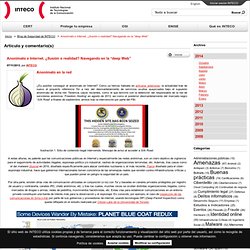
Como ya hemos hablado en artículos anteriores, la actualidad trae de nuevo el proyecto referencia Tor a raíz del desmantelamiento de servicios ocultos auspiciados bajo el supuesto anonimato de dicha red. Tenemos casos recientes, como el que terminó con la detención del responsable de la red de servidores anónimos ‘Freedom Hosting’ en agosto de 2013, así como el posterior desmantelamiento del mercado negro ‘Silk Road’ a finales de septiembre, ambos tras la intervención por parte del FBI.
Ilustración 1. Sitio de contenido ilegal intervenido. Por otra parte, existen otras vías de comunicación utilizadas en conjunción (o no) con Tor y basadas en canales privados protegidos por registro de usuario y contraseña, canales IRC, chats anónimos, etc. y tras los cuales, muchas veces se ocultan distintas organizaciones ilegales, como mercados de drogas o armas, redes de pedofilia, movimientos hacktivistas, etc.
Ilustración 2. ManuaIs_Guides_Tutorials_Tips. Tools: Security - Forensics - Pentesting - Ethical Hacking. CybeerSecurlty. Ciberciudadanos_Netizens. Internet en el 2014: desigual, censurado y mal de privacidad. "Desde el 1 de enero Facebook ya no es un lugar para los amigos, sino para la NSA" Un reportero del portal Infowars revela en su nuevo video cómo la nueva política de Facebook permitirá a los organismos estadounidenses tener acceso a los datos personales de los internautas.
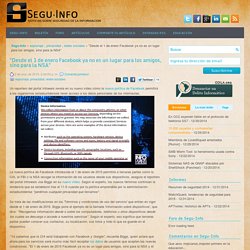
La nueva política de Facebook introducida el 1 de enero de 2015 permitirá a terceras partes como la CIA, el FBI o la NSA recoger la información de los usuarios desde sus dispositivos, asegura el reportero del portal Inforwars Joe Biggs en su nuevo video. Según el experto, los nuevos términos continúan la tendencia que se estableció tras el 11-S cuando por la política emprendida por la administración estadounidense "perdimos cualquier privacidad que teníamos". Se trata de las modificaciones en los 'Términos y condiciones de uso del servicio' que entran en vigor desde el 1 de enero de 2015.
"Ya sabemos que la CIA está trabajando con Facebook y Google", recuerda Biggs, quien aclara que ahora para los servicios será mucho más fácil recopilar los datos de usuarios que acepten las nuevas condiciones. Derecho a la privacidad. Derecho a la privacidad.
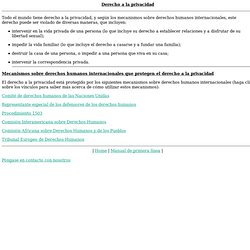
Hackers sacuden la confianza sobre el idealismo del Código Libre. Los hackers han sacudido el movimiento del software libre que una vez simbolizó el idealismo de la Web.

Cómo una mente brillante de la ciberseguridad prefiere usar localizador en vez de un smartphone. Poniendo en tela de juicio las actividades de las agencias de seguridad norteamericanas, Dan Geer opina al respecto y presume su preferencia hacia los buscapersonas, aunque estén por extinguirse, a optar por utilizar uno de los productos más populares en la era digital actual.

Como director de información de seguridad en In-Q-Tel, compañía sin fines de lucro que invierte su tecnología para ayudar a la CIA, y de lo cual reconoce que no es la mejor posición frente a toda la gente que está hambrienta de respuestas. Los gigantes se reunen para combatir a ISIS y la vigilancia de los gobiernos. Las redes sociales Facebook y Twitter, el mastodonte de Internet Google y otras tecnológicas como Microsoft se reunieron en Luxemburgo con altos cargos de la Unión Europea para discutir sobre el avance de la propaganda del terrorismo fundamentalista online y sobre posibles formas de frenarlo.

Así lo publica la BBC, a la cena a la que acudieron representantes de ambas partes. El medio asegura que la preocupación por el uso que los grupos islamistas radicales le dan a las redes sociales como medio de reclutamiento está creciendo entre los gobiernos europeos. EFF Surveillance Self-Defense Project. Descarge el informe “Libertad de expresión en Internet” La Relatoría Especial para la Libertad de Expresión de la Comisión Interamericana de Derechos Humanos, presentó hace poco una versión actualizada de su informe Libertad de Expresión e Internet, el cual se encuentra disponible para todos en la web.

De acuerdo con la organización, en el documento se explican los principios que deben servir de guía para la protección del derecho a la libertad de pensamiento y expresión en el entorno digital. Se describe un sistema de estándares en la materia y se analizan la práctica, la jurisprudencia y la doctrina internacional relevante. Se espera que este recurso sea útil para los activistas de Internet, las organizaciones sociales, los operadores jurídicos y reguladores que deben defender los derechos humanos en el ámbito digital. Descarga el ebook desde aquí. Informe anual 2013 Libertad de prensa en el mundo. Inicio > SOBRE RSF > ACTIVIDADES > INFORME ANUAL ESPAÑA | Reporteros Sin Fronteras presenta el Informe Anual 2013 de la Libertad de Prensa en el Mundo “El año ha estado marcado esencialmente por el gran aumento de los secuestros, más del doble del año anterior”, ha afirmado la presidenta de Reporteros Sin Fronteras España, Malén Aznárez, al presentar el Informe Anual 2013 de la Libertad de Prensa en el Mundo este 6 de febrero en Madrid.
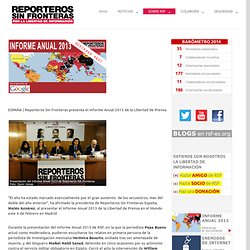
Censura internet latinoamerica - Buscar con Google. Espionaje ONU. Relatoría Especial para la Libertad de Expresión - Informes sobre Paises. <div class="noscript-message"><p>It looks like JavaScript is either disabled or turned off.
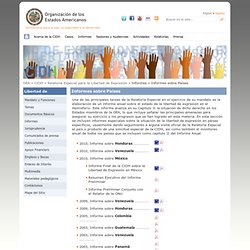
Please enable JavaScript to correctly view this web site. </p><p>Parece que JavaScript está desactivado o apagado. Por favor, activar JavaScript para ver este sitio de web. </p><p>Afigura-se o JavaScript está desativado ou desligado. Por favor ative o JavaScript para visualizar este site. Informes sobre Países Una de las principales tareas de la Relatoría Especial en el ejercicio de su mandato es la elaboración de un informe anual sobre el estado de la libertad de expresión en el Hemisferio. 13 Principles Week of Action: Human Rights Require a Secure Internet. Between 15th-19th of September, in the week leading up the first year anniversary of the 13 Necessary and Proportionate Principles, EFF and the coalition behind the Principles will be conducting a Week of Action explaining some of the key guiding principles for surveillance law reform.
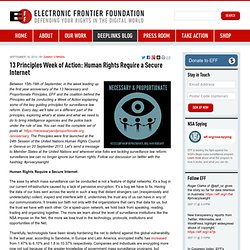
Every day, we'll take on a different part of the principles, exploring what’s at stake and what we need to do to bring intelligence agencies and the police back under the rule of law. How the UN Human Rights Committee Should Apply International Law to NSA Spying. This past Monday, the Human Rights Committee commenced its one hundredth and tenth session in Geneva from March 10-28. To the United Nations: Protect Individuals Right to Privacy in The Digital Age. Today, the Human Rights Committee, a body of independent experts that monitors the implementation of States human rights obligations, is holding its one hundredth and tenth session in Geneva from 10th to 28th March. During this meeting, the Committee will review the reports of the United States (among other countries) on how they are implementing the provisions of the International Covenant on Civil and Political Rights.
Introducing a Compendium of the Released NSA Spying Documents. Dear NSA, Privacy is a Fundamental Right, Not Reasonable Suspicion. Learning about Linux is not a crime—but don’t tell the NSA that. A story published in German on Tagesschau, and followed up by an article in English on DasErste.de today, has revealed that the NSA is scrutinizing people who visit websites such as the Tor Project’s home page and even Linux Journal. This is disturbing in a number of ways, but the bottom line is this: the procedures outlined in the articles show the NSA is adding "fingerprints"—like a scarlet letter for the information age—to activities that go hand in hand with First Amendment protected activities and freedom of expression across the globe.
Protecting Your Anonymity: A How-to for Sex Workers. Just as you take steps to protect your personal safety and health while engaging in real-life encounters, a sex worker should also be mindful of the dangers of the online world. As we wrote in a separate blog post today, the sex worker forum MyRedBook, along with its companion sites, have been seized by the FBI in connection with a criminal indictment. International Community Unites to Protest Big Brother.
Transparency Tip: How to Track Government Projects Like a Defense Contractor. Over the last year, thousands of pages of sensitive documents outlining the government’s intelligence practices have landed on our desktops. Russia Blocks Access to Major Independent News Sites. Russia's government has escalated its use of its Internet censorship law to target news sites, bloggers, and politicians under the slimmest excuse of preventing unauthorized protests and enforcing house arrest regulations. Today, the country's ISPs have received orders to block a list of major news sites and system administrators have been instructed to take the servers providing the content offline. The banned sites include the online newspaper Grani, Garry Kasparov's opposition information site kasparov.ru, the livejournal of popular anti-corruption crusader Alexei Navalny, and even the web pages of Ekho Moskvy, a radio station which is majority owned by the state-run Gazprom, and whose independent editor was ousted last month and replaced with a more government-friendly director.
Obama Nominates Former SOPA Lobbyist to Help Lead TPP Negotiations. President Obama has nominated former SOPA lobbyist Robert Holleyman to join the team of U.S. negotiators leading the Trans-Pacific Partnership (TPP) talks. If confirmed by the Senate, the former chief executive officer of the Business Software Alliance (BSA) would serve as a Deputy to the U.S. Trade Representative. Surveillance and Pressure Against WikiLeaks and Its Readers. The Intercept recently published an article and supporting documents indicating that the NSA and its British counterpart GCHQ surveilled and even sought to have other countries prosecute the investigative journalism website WikiLeaks. GCHQ also surveilled the millions of people who merely read the WikiLeaks website. The article clarifies the lengths that these two spy organizations go to track their targets and confirms, once again, that they do not confine themselves to spying on those accused of terrorism.
One document contains a summary of an internal discussion in which officials from two NSA offices discuss whether to categorize WikiLeaks as a "malicious foreign actor" for surveillance targeting purposes. ¿Quién gestiona Internet? Internet está gobernada por una red internacional descentralizada de grupos autónomos interconectados provenientes de la sociedad vivil, el sector privado, los gobiernos de los distintos países, las comunidades académica y científica y organizaciones nacionales e internacionales. Todas, asegura la ICANN en esta infografía en la que se detalla el papel de cada una y su forma de trabajar en cooperación, se dedican desde sus respectivos roles a crear políticas compartidas y estándares que mantengan la interoperabilidad global de la Red para el bien público.
Los Usuarios de Internet del Mundo Exigen el Fin de la Vigilancia Masiva En "El Día Que Dijimos Basta" El Martes 11 de Febrero, organizaciones de derechos digitales, grupos de la sociedad civil, los autores y los usuarios de Internet a través de seis continentes saldrán a las calles digitales para exigir el fin de la vigilancia masiva. El verano pasado, el contratista NSA Edward Snowden comenzó a filtrar documentos que detallan las alarmantes operaciones de espionaje llevadas a cabo por los EE.UU., Gran Bretaña y otros países aliados. Las revelaciones sobre la ausencia de límites en la vigilancia masiva de parte de los gobiernos han galvanizado personas en todo el mundo, dando lugar a condenas de líderes mundiales y una resolución de las Naciones Unidas para proteger la privacidad en la era digital.
Las acciones programadas para el 11 de febrero, "El Día Que Dijimos Basta", incluyen: Argentina: Asociación por los Derechos Civiles y Fundación Vía Libre anunciarán su litigio contra la comisión supervisora de inteligencia en el Congreso argentino. One Planet, One Internet: A Call To the International Community to Fight Against Mass Surveillance. The Snowden revelations have confirmed our worst fears about online spying. After NSA Backdoors, Security Experts Leave RSA for a Conference They Can Trust. We thought we won the Crypto Wars, the fight to make strong encryption accessible to all, in the 1990s. We were wrong. Last month, Reuters broke news about a deal struck between the popular computer security firm RSA and the National Security Agency. 2013 in Review: States Stepping Up Digital Privacy Protection. As the year draws to a close, EFF is looking back at the major trends influencing digital rights in 2013 and discussing where we are in the fight for free expression, innovation, fair use, and privacy.
Click here to read other blog posts in this series. As the outcry against NSA spying and electronic surveillance has grown, the need to protect privacy through legislation has never been higher. With law enforcement itching to use aggressive new surveillance techniques from drones to facial recognition to fight crime, privacy is often discarded by the wayside as collateral damage. 2013 in Review: CDA 230 and Recurring Threats to Strong Online Speech Protections. As the year draws to a close, EFF is looking back at the major trends influencing digital rights in 2013 and discussing where we are in the fight for free expression, innovation, fair use, and privacy.
Click here to read other blog posts in this series. Our favorite online free speech law, Section 230 of the Communications Decency Act (CDA 230), is under attack. The law ensures that online intermediaries are not liable for their users' actions, meaning that online speech platforms remain robust and widely available.
2013 in Review: Encrypting the Web Takes A Huge Leap Forward. As the year draws to a close, EFF is looking back at the major trends influencing digital rights in 2013 and discussing where we are in the fight for free expression, innovation, fair use, and privacy. Click here to read other blog posts in this series. This year the public got some hints of the scale on which governments are using electronic surveillance to spy on all of us. We learned how pervasively compromised our communications infrastructure is, and how cavalierly governments have spliced, bribed, lied, hacked, cozened, and secret-ordered their way into network backbones.
2013 in Review: Revelations, Tragedy, and Fighting Back. What We Learned About NSA Spying in 2014—And What We're Fighting to Expose in 2015: 2014 in Review. Hackean la web “Angry Birds” y los convierten en “Spying Birds” El FBI quiere controlar las comunicaciones por Internet en tiempo real: Gmail, Skype, Dropbox… Herramientas del espionaje de la Agencia de Seguridad Nacional. Los Servicios Secretos Rusos Buscan Controlar Datos Personales en Internet. Informe sobre "ciberespionaje" chino. Espionaje tecnológico y control del poder. Las formas ocultas en que nos siguen el rastro en nuestra vida cotidiana - BBC Mundo. ¿Podrá tu rostro ser utilizado en tu contra? - BBC Mundo. How Digital Forensic Investigations Are Affected by Mobile App Privacy Settings. Google For Spies: How the NSA Created Its Own Search Engine. Hackean empresa que desarrolla 'FinFisher' spyware usado por los gobiernos [40 GB filtrados (incluido FinFisher)]
Éste es el equipo de 600 “hackers ultrasecretos” de Obama. Tracking Censorship through Copyright Proposals Worldwide. Free Speech is Only As Strong As the Weakest Link. Your policy on the use of software for the purpose of statesurveillance - Letter-to-antivirus-companies. Yahoo's fight against US govt secret surveillance revealed. Avast es acusado de utilizar adware para recopilar el historial de navegación de sus usuarios. Antivirus Companies Shouldn’t Have Hidden What They Knew About Regin Government Malware. Transparency. eff. Re:publica 2012: libertad y vigilancia, tecnología y futuro. ¿ D'onde est'an tus datos personales ? ¿Cuánto cuesta tu historial en internet? Marketing digital y Habeas Data. Recomendaciones Jurídicas.
Los internautas quieren privacidad, pero, ¿realmente sirve de algo? ¿Qué tan ‘anónimo’ se puede ser on line? ¿Sabe qué información suya se encuentra en Internet? Anonymity, Privacy, and Security Online. Internet predators. Análisis. ¿Debo tapar la webcam del ordenador? Pornovenganza via @sumerelias. Amazing mind reader reveals his 'gift'.
¿Cómo denunciar delitos informáticos? - Tutorial En @EnTicConfio. Cada segundo se crean tres nuevos virus informáticos en el mundo. Informe anual de seguridad de Cisco 2014. lCT_Securlty_Reports_2012. Cyber_crime. Cyber_War. Acktlvlsm. Net_Freedom. BIoggers. Journalist. Perli0distas. VV0mens Day 2013. Hackers_Hacking. Deep_Web. Self Defense - Seguridad Personal.